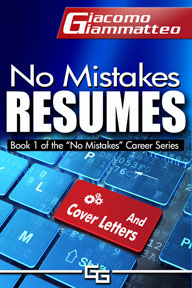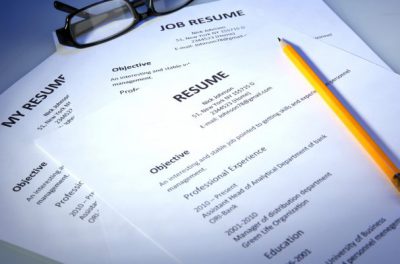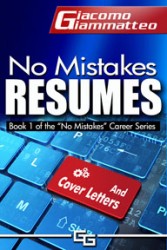What To Capitalize On Your Resume
Capitalization
Many people who write resumes have an inclination to capitalize damn near everything. Perhaps they think that by capitalizing words, those words, or the functions they represent, become more important; ergo, the person becomes more important. (Did I just use the word ergo? I did, didn’t I? Smack me if I ever do that again.)
Back to capitalization
So THE CAPITALIZERS—Their Resumes End Up Looking Like This, instead of like this. It Makes It Damn Difficult To Read When The Wrong Words Are Capitalized. I Have Nothing Against Capitals, But You Should Only Use Them Where They Belong. AND DON’T EVER USE ALL CAPS. IT’S EVEN WORSE.
Here are some real examples:
- Vast experience working with Quality systems and Regulatory filings. . .
- Worked with Clinical, Regulatory, Marketing, and Operations managers to facilitate. . .
- Responsible for the execution of Process Qualifications/Validation protocols and reports.
- Managed four Project Managers and a Project Coordinator.
- Implemented and executed Corrective Action Plans in Manufacturing and Quality Systems allowing the company to emerge from Consent Decree and resume distribution within 9 months.
In the examples above, none of the words should have been capitalized, except the first words of each sentence. This can be confusing, especially when dealing with a resume. Here are a few rules of capitalization. There are plenty of others, but these cover most of what you’ll experience when writing a resume.
Capitalize. . .
- The first word in a sentence and/or the first word of a bullet point.
- Proper nouns.
- Names of universities.
- Degrees obtained.
- Company names.
- Titles of jobs you held.
- Specific department names.
- Days of week, and months (but not seasons).
- Names of cities, states, countries, and languages.
- Brand names—Coke, Chevrolet, Microsoft Word, Vaseline, Xerox. . .
Let’s look at examples of the list and clarify a few things. Degrees—when used to cite what degree you obtained, or if it’s a proper noun in itself, you capitalize. So, BA in Economics is in caps, but if you refer to it later and mention, “. . .I studied economics in college. . .” it is not capitalized. You would, however, capitalize it if it were Spanish or English.
Titles of jobs—when used specifically, as when you list your job title, it is capitalized, but if you were to use it generically in a sentence it’s not. So, your title at XYZ Company was “Sales Representative,” when you list it on your resume in the Work History section, but if you mention it on your cover letter like this, “. . .worked as a sales representative at XYZ Company. . .” you would not capitalize it.
Department names—this is perhaps the most confusing area, and it can get downright baffling. If you are referring to a specific department name, for example, “. . .the detective worked in the “Homicide Department,” it would be capitalized, but you’d write, “. . .he was a homicide detective,” without caps.
Industries—this is one that far too many people go overboard with. They write things like, “. . .experience in Pharmaceutical industry, or Semiconductors, or Automotive, Aerospace, Film, Computer. . . industry.” None of these should be capitalized in this context.
There are a lot more areas that might be questionable. If you need references, I’d suggest checking out sites like Daily Writing Tips or Grammar Girl’s Quick and Dirty Tips, or The Associated Press style book.
Bottom Line
No one is going to trash your resume over a few mistakes in capitalization, but when the mistakes keep piling up, and a gatekeeper is on her 100th resume of the day, it’s easy for her to get frustrated. Overuse of capitalization makes a resume difficult to read, not to mention it looks plain silly.
Many people scoff at articles like this, dismissing the advice with a “things like that don’t matter,” attitude. But put yourself in a gatekeeper’s role. You’ve looked at all of those resumes, seen hundreds, if not thousands, of mistakes for the day—wouldn’t it be refreshing to read a resume without mistakes? It might even make you take notice of the person who wrote it. Maybe read with more insight. Pique your interest in what they’ve done. After all, if they can write a resume with no mistakes, maybe they can do other things the right way.
And please keep in mind, unless you’ve found a back door into the company or some other way to avert the screening process, that gatekeeper is your ticket. She’s the one—the only one—who can let you in the door.
If you enjoyed this post, please share.
If you liked this post, you might want to check out my resume/cover letter book, No Mistakes Resumes. If you buy it here, it’s guaranteed. In fact, to my knowledge, my books are the only guaranteed books on the Internet.






















Very useful and nessasary tips. Great job! And an animal sactuary sounds like a wonderful dream. Keep up the good tips, aritcals and all of your writing skills.
Twitter: JimGiammatteo
says:
Thanks, Christine. Glad you found some of this useful. And yes, the sanctuary is a dream–one with a lot of word, but a dream nonetheless.
If you have some extra time and you want to do a mom of a very cute little boy who doesn’t want to loose her house and no longer work for the “devil” I am working for, I love for you to take a moment to check out my resume. I know a resume is the first window a future employer has to see into the skills and benefits I can bring to their company and I want to make sure my window has the best view. However I know you are very busy, I just thought I’d ask. It never hurts to ask right? Thanks for your time, reply and awesome tips!
Very useful and nessasary tips. Great job! And an animal sactuary sounds like a wonderful dream. Keep up the good tips, aritcals and all of your writing skills.
Thank you so much! I find the random capitalization annoying.
Great information. Can you address the proper way to use caps in my name at the top of my resume. Is using all caps in my name an disastrous mistake? Thank you, Wayne
\
THANKS SO MUCH!
Hello There. I found your blog using msn. This is a very well written article.
I’ll be sure to bookmark it and come back to rdad more of your useful info.
Thankos for the post. I’ll definitely return.
m88 ทางเข้า recently posted..m88 ทางเข้า
Hello, I enjoy reading through your article post.
I wanted to write a little comment to support you.
thehacker-news.com recently posted..thehacker-news.com
Thanks for the information. One question remains: You do capitalize a word at the beginning of a bullet point, but do you add a period? Most bullet points do not contain actual sentences so I always assume this is an error as well (I noticed your bullet points contain periods). I will Google to find out more, but thought I would mention it to you. Thanks again.
Twitter: JimGiammatteo
says:
Sorry for such a horrendously late reply, but last year I had 2 heart attacks and 2 strokes. It kept me out of pocket for the entire year. But to answer your question, yes, you are right: a bullet point does not need periods. The main thing is to be consistent, so either use them, or don’t, but do it consistently. If you practice consistency, you won’t get into trouble.
Thanks for this. What about the student’s major in college? Should that be capitalized in a short bio? For example, Jennifer majored in Business Management?
Thanks for this. What about the student’s major in college? Should that be capitalized in a short bio? For example, “Jennifer majored in Business Management?”
Twitter: JimGiammatteo
says:
Sorry for being late in replying. Hope the article in this link helps. http://nomistakes.org/wp-content/uploads/2014/04/3-Rules-of-Capitalization-New-2.jpg
Jim Giammatteo recently posted..Everything You Need to Know About Numbers on Résumés
This website was… how doo you say it? Relevant!!
Finally I’ve found something that helped me. Thank you!
Kaylene recently posted..%anchor_text%
I would like to think a huge thankyou would make your day and make your time and effort worthwhile!
Thankyou!
Hi Giammatteo,
I really like your post!!
All these tips are very good and easy to understand. I realized my mistake after reading this article. I didn’t understand the rejection of myself for the job until I didn’t read your post. But when I read your post, then truly I realize the rejection of myself in the interview. Now I am working to get good job by following your tips!! I hope this will give me my dream job which I always wished
Thanks for such an informative and useful post!!
Regards
Arielle
Arielle recently posted..3 Linguistic Mistakes That Horribly Deflate Your Executive Resume.
Twitter: JimGiammatteo
says:
Good luck, and thanks for commenting.
Useful and necessary tips…. i also have an site that my interest
quality audit
Thank you for sharing this, because it is very hard to know exactly what is the best practices for this. Capitalization is pretty tricky, and for resumes it gets its own sets of rules.
fantastic issues altogether, you just won a emblem new reader.
What might you suggest in regards to your submit that you simply made some days ago?
Any positive?
tools for photographers and creative professionals recently posted..tools for photographers and creative professionals
I have noticed you don’t monetize your site,
don’t waste your traffic, you can earn additional bucks every month.
You can use the best adsense alternative for any type of
website (they approve all websites), for more details simply search in gooogle: boorfe’s tips monetize your website
BestBianca recently posted..BestBianca
I also recommend that people run their job titles and other parts of their resumes through this free capitalization tool: https://capitalizemytitle.com/
Great tips. It always annoys me when people don’t capitalize their job titles correctly. There are some more great tips and examples here: https://capitalizemytitle.com/resume-capitalization-rules-and-guidelines/
My brother recommended I might like this blog. He was once entirely right.
This submit actually made my day. You cann’t believe justt how much
time I had spent for this information! Thanks!
Will Supplies recently posted..Will Supplies